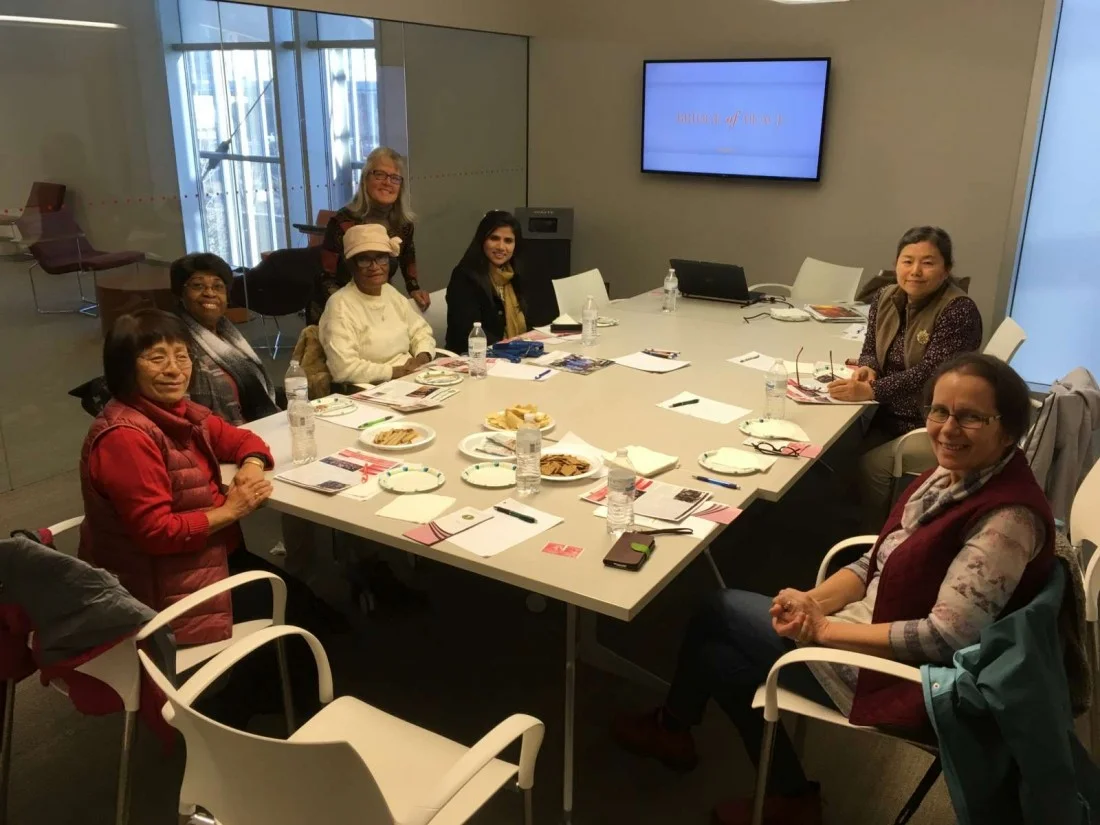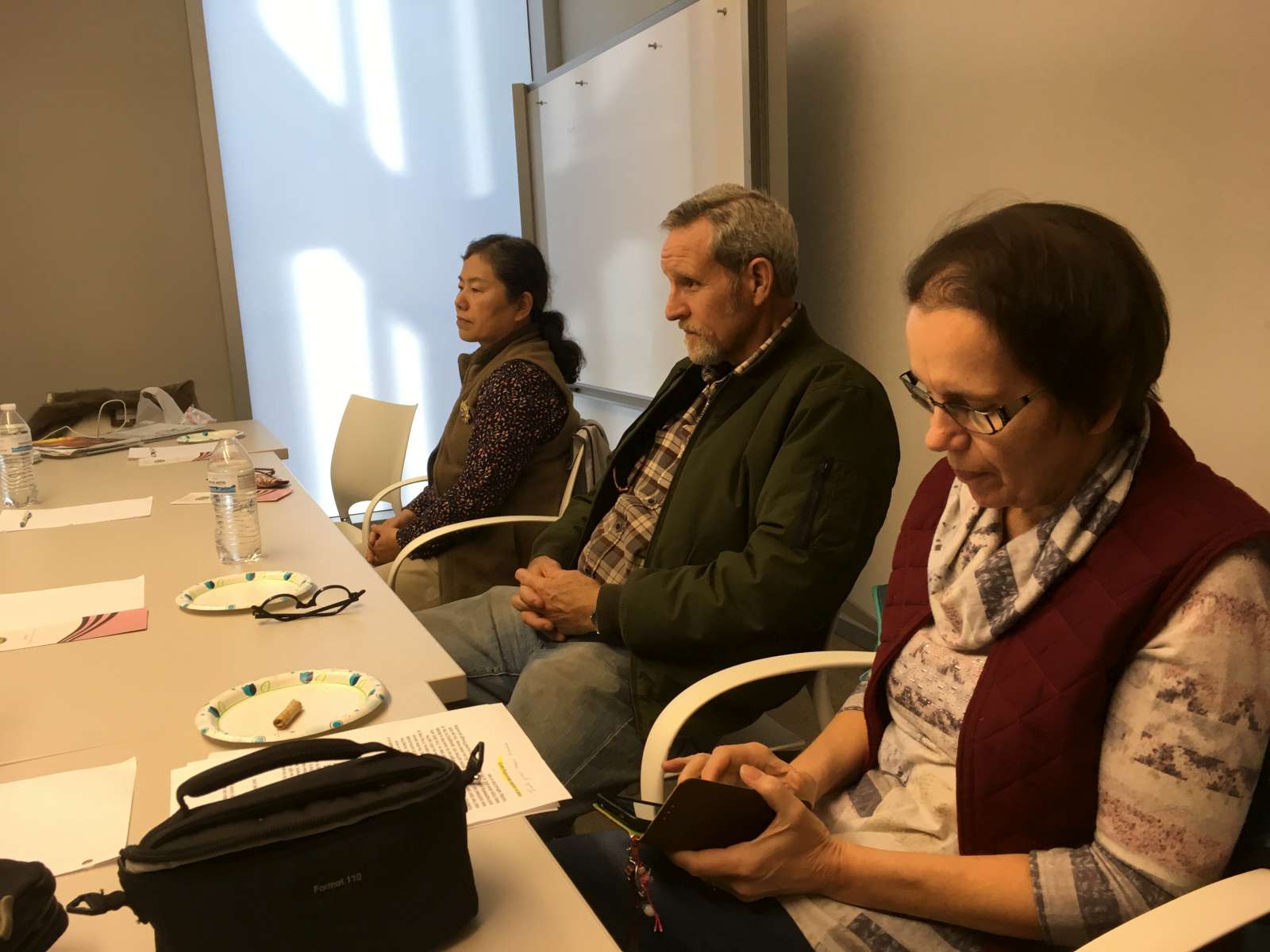FAMILY TRADITIONS AROUND THE WORLD: WFWP MONTANA CONCLUDES AN EXCITING FIRST YEAR
Out on the Great Plains is the large town of Billings, Montana, cradled in a prehistoric bowl which once was an inland sea. Circling above the city are The Rims, and these tall cliffs offer a stunning vantage point of downtown Billings, the Yellowstone River, Montana State University, the Doubletree Inn, and Phillips 66 Oil Refinery. In the autumn, the panorama below The Rims is filled with red, orange and yellow, which dress up the scene with brilliant fall colors. The walking, hiking and bike paths on The Rims are all well-used, much-loved places to catch glowing sunsets throughout the year.
Nestled in the midst of all this beauty is our 2018-launched Women’s Federation for World Peace Montana Chapter. In October and November, we held two meetings at the Billings Public Library. It’s a serene environment with a brilliant backdrop that inspired our members, many of whom have known each other for quite a while. Though most of our members are active in other service organizations, WFWP has given us the opportunity to meet with women and men who strive for peace as “peace-loving global citizens.”
WFWP embraces cultural and religious diversity and thus brings people from different backgrounds together, as evidenced by the range of topics and participants at our events this year. After an introductory meeting in February and a second one in April, the third WFWP meeting was held on October 13. Exploring the theme of “Families are Forever,” participants discussed different family traditions, the concept of forgiveness and how it connects our family more closely.
One guest from Pakistan, Asma Batool, is on a fellowship at MSU-Billings, and she openly shared her core reason for wanting to come to America, namely to learn how to promote education for girls and women in rural, marginalized regions of her country. She made use of a model at MSU-Billings originally developed for Native Americans. As a mentor, she wants to encourage females to begin basic education, which requires the support of their parents who, for the most part, haven’t gone to school. Most of these families favor education for sons, and not daughters. Asma believes that by eliminating gender bias, equal opportunities for men and women can bring increased economic growth to Pakistan.
On November 17, the WFWP Montana Chapter drew in nine women and men to talk about “Holiday traditions celebrated in our families.” Fortunately for us, there were several different parts of the world, and even differing areas in the United States, represented by guests and members who attended the meeting. Each person shared their family traditions for holidays: what they practiced in their family of origin, what they practiced after they married and had children, and new family traditions they would like to introduce.
Astrid Woods talked about the German Christmas tradition she recalls from her childhood. “My mother brought the tree home on Christmas Eve. She put it in the living room, and closed the door. We ate lunch, and took a long nap. Afterwards we dressed in our best clothes, and passed the time listening to radio while she decorated the tree with tinsel, and lit it with real candles. We were so excited to go in, and see the beautiful, glowing tree!” Later, her mother left the room to go see if the Christ Child had come. She brought the gifts to her children, and they understood it was Jesus, not Santa who was the giver of gifts.
Another guest, Pinkie (Alice) Scott, grew up in the United States and shared her family traditions: “My mother baked a lot of pies and cakes, so anyone who came could have some. She must have made 25-30 pies and cakes, and people from everywhere came to visit. We lived in the country, so they had to go a long way! We cut down any tree we wanted to, because they were all around us. When it came to decorating the tree, we had no electricity, and we used garlands and glow-in-the-dark ornaments. The sun shone during the day and made the ornaments shine at night. When people came over we had a lot of fun, and visited together for a long time. When it was time to go, we walked back-and-forth with them so we could talk more, and this went on until 2:00 in the morning!”
Similarly, Blanche Jackson recalled her childhood memories in Oklahoma. “My mother cooked and baked a lot, and we had lots of company. We lived in a little town between Tulsa and Oklahoma City called Cushing. There were six of us, so we each had one present under the tree. In Oklahoma everybody would cook a lot, and people would drop by and visit and eat. It was a lot of fun!”
In parts of the world where Christmas is not celebrated, other traditions bring families together. Fusako Martin shared her experience growing up in Okinawa, Japan. “We are not a Christian nation, so we don’t celebrate Christmas. We buy new clothes once a year, before the new year comes. Also, we pay off all our debts, and replace broken dishes with new ones. We believe that all the good spirits of our ancestors come down, and we prepare special foods for them. Afterwards, when those foods are eaten, we say that all the flavor has gone, because they were “eaten” by the spirits of our ancestors. Only two percent of Japanese are Christian, and my mother is part of the two percent.”
Kimiko DiLorenzo, also from Japan, shared her experience: “We clean up the whole house, then make rice cakes colored white and red, which are happy celebration colors. These are offered to ancestors, and after three days we take them to the kitchen and cut and dry them. Children visit friends and relatives to greet them, and they receive money. I didn’t grow up as a Christian in Japan. In Japan we do believe that there is a “center,” but we don’t use the word, “God.”
As a Muslim, Asma Batool had a very different experience growing up. Her family observed two major Muslim holidays: "One is a 30 day fast from sunrise to sunset, and the other is the pilgrimage to Mecca. After the pilgrimage we sacrifice an animal. The animal is one we can afford, like a cow, sheep, goat or camel. The animals are divided into three parts, one for the family, one part is for relatives and the final part is for deserving poor. If people have enough money, they want to go on the pilgrimage, and this year, if I hadn’t come to America for the fellowship opportunity, I may have done it. You have to return to your parents’ home for these two holidays. We also go around to visit our relatives and eat and celebrate together.”
To wrap up our meeting, Astrid Woods, who is a registered nurse at St. Vincent de Paul, gave a talk about managing stress during the holiday season. One tip was to plan ahead: do your shopping on Black Friday and Cyber Monday instead of Christmas Eve.
She also debunked stress myths, and encouraged everyone to get together with loved ones and friends more often on holidays, and though holidays can be stressful, most of us look forward to, and make an effort to be in touch with people we care about at these important times of year. It was a wonderful way for WFWP to end the year on a high note, with heartfelt sharing among each other at our meetings.
Happy holidays to everyone from Billings, Montana!



